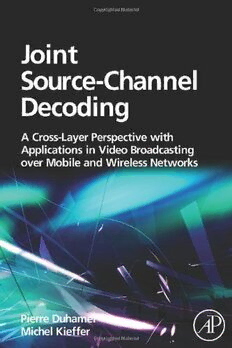Download Joint Source-Channel Decoding: A Cross-Layer Perspective with Applications in Video Broadcasting PDF Free - Full Version
Download Joint Source-Channel Decoding: A Cross-Layer Perspective with Applications in Video Broadcasting by Pierre Duhamel, Michel Kieffer in PDF format completely FREE. No registration required, no payment needed. Get instant access to this valuable resource on PDFdrive.to!
About Joint Source-Channel Decoding: A Cross-Layer Perspective with Applications in Video Broadcasting
Treats joint source and channel decoding in an integrated way Gives a clear description of the problems in the field together with the mathematical tools for their solution Contains many detailed examples useful for practical applications of the theory to video broadcasting over mobile and wireless networks Traditionally, cross-layer and joint source-channel coding were seen as incompatible with classically structured networks but recent advances in theory changed this situation. Joint source-channel decoding is now seen as a viable alternative to separate decoding of source and channel codes, if the protocol layers are taken into account. A joint source/protocol/channel approach is thus addressed in this book: all levels of the protocol stack are considered, showing how the information in each layer influences the others. This book provides the tools to show how cross-layer and joint source-channel coding and decoding are now compatible with present-day mobile and wireless networks, with a particular application to the key area of video transmission to mobiles. Typical applications are broadcasting, or point-to-point delivery of multimedia contents, which are very timely in the context of the current development of mobile services such as audio (MPEG4 AAC) or video (H263, H264) transmission using recent wireless transmission standards (DVH-H, DVB-SH, WiMAX, LTE). This cross-disciplinary book is ideal for graduate students, researchers, and more generally professionals working either in signal processing for communications or in networking applications, interested in reliable multimedia transmission. This book is also of interest to people involved in cross-layer optimization of mobile networks. Its content may provide them with other points of view on their optimization problem, enlarging the set of tools which they could use. Pierre Duhamel is director of research at CNRS/ LSS and has previously held research positions at Thomson-CSF, CNET, and ENST, where he was head of the Signal and Image Processing Department. He has served as chairman of the DSP committee and associate Editor of the IEEE Transactions on Signal Processing and Signal Processing Letters, as well as acting as a co-chair at MMSP and ICASSP conferences. He was awarded the Grand Prix France Telecom by the French Science Academy in 2000. He is co-author of more than 80 papers in international journals, 250 conference proceedings, and 28 patents. Michel Kieffer is an assistant professor in signal processing for communications at the Universit? Paris-Sud and a researcher at the Laboratoire des Signaux et Syst?mes, Gif-sur-Yvette, France. His research interests are in joint source-channel coding and decoding techniques for the reliable transmission of multimedia contents. He serves as associate editor of Signal Processing (Elsevier). He is co-author of more than 90 contributions to journals, conference proceedings, and book chapters. Treats joint source and channel decoding in an integrated way Gives a clear description of the problems in the field together with the mathematical tools for their solution Contains many detailed examples useful for practical applications of the theory to video broadcasting over mobile and wireless networks
Detailed Information
| Author: | Pierre Duhamel, Michel Kieffer |
|---|---|
| Publication Year: | 2010 |
| ISBN: | 9780123744494 |
| Pages: | 325 |
| Language: | English |
| File Size: | 3.778 |
| Format: | |
| Price: | FREE |
Safe & Secure Download - No registration required
Why Choose PDFdrive for Your Free Joint Source-Channel Decoding: A Cross-Layer Perspective with Applications in Video Broadcasting Download?
- 100% Free: No hidden fees or subscriptions required for one book every day.
- No Registration: Immediate access is available without creating accounts for one book every day.
- Safe and Secure: Clean downloads without malware or viruses
- Multiple Formats: PDF, MOBI, Mpub,... optimized for all devices
- Educational Resource: Supporting knowledge sharing and learning
Frequently Asked Questions
Is it really free to download Joint Source-Channel Decoding: A Cross-Layer Perspective with Applications in Video Broadcasting PDF?
Yes, on https://PDFdrive.to you can download Joint Source-Channel Decoding: A Cross-Layer Perspective with Applications in Video Broadcasting by Pierre Duhamel, Michel Kieffer completely free. We don't require any payment, subscription, or registration to access this PDF file. For 3 books every day.
How can I read Joint Source-Channel Decoding: A Cross-Layer Perspective with Applications in Video Broadcasting on my mobile device?
After downloading Joint Source-Channel Decoding: A Cross-Layer Perspective with Applications in Video Broadcasting PDF, you can open it with any PDF reader app on your phone or tablet. We recommend using Adobe Acrobat Reader, Apple Books, or Google Play Books for the best reading experience.
Is this the full version of Joint Source-Channel Decoding: A Cross-Layer Perspective with Applications in Video Broadcasting?
Yes, this is the complete PDF version of Joint Source-Channel Decoding: A Cross-Layer Perspective with Applications in Video Broadcasting by Pierre Duhamel, Michel Kieffer. You will be able to read the entire content as in the printed version without missing any pages.
Is it legal to download Joint Source-Channel Decoding: A Cross-Layer Perspective with Applications in Video Broadcasting PDF for free?
https://PDFdrive.to provides links to free educational resources available online. We do not store any files on our servers. Please be aware of copyright laws in your country before downloading.
The materials shared are intended for research, educational, and personal use in accordance with fair use principles.

